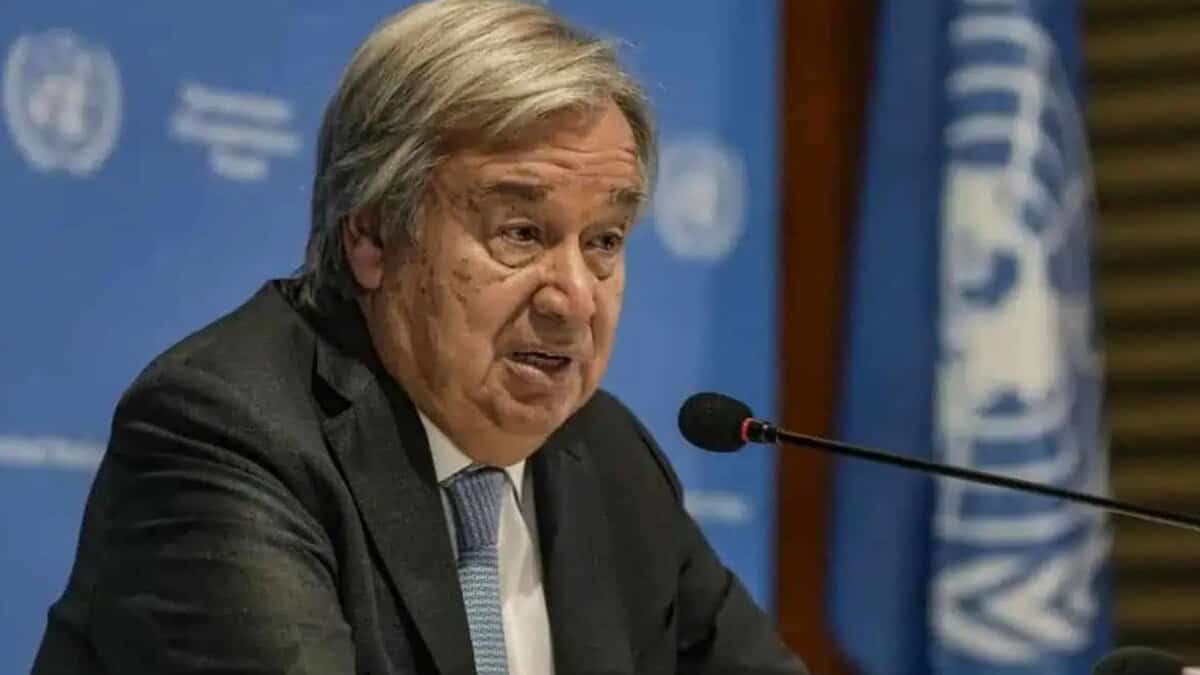
Washington: World leaders, including UN chief Antonio Guterres and US President Donald Trump, on Wednesday, May 7, called on India and Pakistan to exercise restraint and hoped that the hostilities would end “very quickly”.
In retaliation against the Pahalgam terror attack, Indian armed forces early Wednesday carried out missile strikes on nine terror targets in Pakistan-occupied Kashmir (PoK) and Pakistan, including Bhawalpur, a stronghold of the Jaish-e-Mohammad (JeM) terror outfit.
UN, US urge restraint as tensions escalate
UN Secretary-General Guterres called for “maximum military restraint” from India and Pakistan, saying the world cannot afford a military confrontation between the two countries.
“The Secretary-General is very concerned about the Indian military operations across the Line of Control and the international border. He calls for maximum military restraint from both countries. The world cannot afford a military confrontation between India and Pakistan,” the secretary-general’s spokesman, Stephane Dujarric, said.
US President Trump said he hopes that the hostilities will end “very quickly”.
“It’s a shame, he said, adding, “We heard about it just as we were walking in the doors of the Oval (Office). I guess people knew something was going to happen based on a little bit of the past.”
“They’ve been fighting for a long time. They’ve been fighting for many, many decades and centuries, actually, if you really think about it,” Trump said.
Asked if he has any message for the countries, he said, “No, I just hope it ends very quickly.”
US Secretary of State Marco Rubio said he was closely monitoring the situation between India and Pakistan.
Global powers back dialogue over conflict
Russia also expressed deep concern at the escalation of military confrontation between India and Pakistan in the wake of the Pahalgam terror attack.
“We are deeply concerned about the intensifying military confrontation between India and Pakistan after the terrorist attack near the city of Pahalgam,” Russia Foreign Ministry spokesperson Maria Zakharova was quoted as saying by state-run news agency TASS.
“We call on the parties involved to exercise restraint in order to prevent further deterioration of the situation in the region.
“We hope that the differences between New Delhi and Islamabad will be resolved through peaceful, political and diplomatic means on a bilateral basis in accordance with the provisions of the Simla Agreement of 1972 and the Lahore Declaration of 1999,” the spokesperson said in a statement in the wake of ‘Operation Sindoor’.
British Prime Minister Keir Starmer said the UK is engaging with both India and Pakistan to push for dialogue and de-escalation.
“Rising tensions between India and Pakistan will be of serious concern for many across Britain. We are engaging urgently with both countries, as well as other international partners, encouraging dialogue, de-escalation and the protection of civilians,” he told the House of Commons.
Foreign Secretary David Lammy said the tensions between India and Pakistan are a serious concern and urged the countries to “show restraint and engage in direct dialogue to find a swift, diplomatic path forward”.
“The UK has close and unique relationships with both countries. I have made clear to my counterparts in India and Pakistan that if this escalates further, nobody wins. The UK was clear in its condemnation of the horrific terrorist attack in Pahalgam last month. We need all sides to work urgently to see regional stability restored and ensure protection of civilians,” he said.
Business and Trade Secretary Jonathan Reynolds described the situation in Jammu and Kashmir as “hugely worrying”.
“Our message would be that we are a friend, a partner to both countries. We stand ready to support both countries. Both have a huge interest in regional stability, in dialogue, in de-escalation and anything we can do to support that, we are here and willing to do,” he said.
UK’s former prime minister Rishi Sunak said, “India is justified in striking terrorist infrastructure. There can be no impunity for terrorists.”
“No nation should have to accept terrorist attacks being launched against it from land controlled by another country,” he posted on X.
Scotland’s First Minister John Swinney took to social media soon after news of Operation Sindoor hit the headlines in the UK overnight.
“I am deeply concerned by the events in Kashmir tonight and urge calm and dialogue to avoid further conflict,” he said.
The German foreign ministry in a post on X said following the horrific terrorist attack in Kashmir and the Indian military response to it, responsible action from both countries is urgently needed.
“Escalation must be prevented and civilians protected. We are in contact with both India and Pakistan,” it said.
In an interview on TF1 television, French Foreign Minister Jean-Noel Barrot said, “We understand India’s desire to protect itself against the scourge of terrorism, but we obviously call on both India and Pakistan to exercise restraint to avoid escalation and, of course, to protect civilians.”
The United Arab Emirates asked India and Pakistan “to exercise restraint, de-escalate tensions, and avoid further escalation that could threaten regional and international peace,” according to a statement from UAE Deputy Prime Minister of Foreign Affairs Sheikh Abdullah bin Zayed Al Nahyan.
“His Highness stressed the importance of heeding the voices calling for dialogue and mutual understanding to prevent military escalation, strengthen stability in South Asia, and avoid further regional tensions,” the statement said.
“His Highness reaffirmed that diplomacy and dialogue remain the most effective means of peacefully resolving crises, and achieving the shared aspirations of nations for peace, stability, and prosperity.”
Bangladesh’s Ministry of Foreign Affairs said the government “is closely observing the evolving situation in India and Pakistan” and expresses its deep concern over the situation.
It urged both the countries to “remain calm, show restraint and refrain from taking any steps that could further aggravate the situation”.
The ministry said, “In the spirit of regional peace, prosperity and stability, Bangladesh remains hopeful that tensions will be defused through diplomatic endeavours, and that peace will ultimately prevail for the benefits of the peoples in the region.”
Neighbours, allies call for calm and cooperation
China called on India and Pakistan to exercise maximum restraint in the “larger interest of peace and stability” of the region and said it will play a “constructive role” in easing the tensions by working with the international community.
“We are concerned about the ongoing situation… India and Pakistan are and will always be each other’s neighbours. They are both China’s neighbours as well… We urge both sides to act in the larger interest of peace and stability, remain calm, exercise restraint and refrain from taking actions that may further complicate the situation,” China’s Foreign Ministry said in a statement.
Elaborating Beijing’s stand, Chinese Foreign Ministry spokesman Lin Jian said China “stands ready to work with the international community to continue to play a constructive role in easing the current tensions”.
Turkiye’s foreign ministry in a statement said it was following the developments between Pakistan and India with “concern”.
“We call on the parties to exercise common sense and refrain from unilateral actions. We expect that measures will be taken to reduce tensions in the region as soon as possible and that the necessary mechanisms, including in the field of counter-terrorism, will be put in place to prevent the recurrence of similar incidents,” it said.
Qatar’s Ministry of Foreign Affairs in a statement said it is following with deep concern the continued escalation between India and Pakistan, and urged both countries “to exercise maximum restraint, give priority to the voice of wisdom, respect the principles of good neighbourliness, and resolve the crisis through diplomatic means”.
The ministry emphasised the “urgent need” to keep communication channels open between India and Pakistan to defuse tensions and address unresolved issues between them through constructive dialogue, “ultimately leading to comprehensive, consensual, and sustainable solutions”. It also reiterates Qatar’s full support for all regional and international efforts aimed at promoting security, peace, and stability in the region.
Japan’s Chief Cabinet Secretary Yoshimasa Hayashi said the government is following the situation closely while reiterating its condemnation of the terrorist attack in Kashmir last month.
“We are strongly concerned that further retaliatory exchanges will escalate into a full-blown military conflict,” the top government spokesman said at a press conference.
“We strongly urge India and Pakistan to exercise restraint and stabilise the situation through dialogue for the peace and stability of South Asia,” Hayashi was quoted as saying by the Kyodo News.
(With inputs from PTI)


